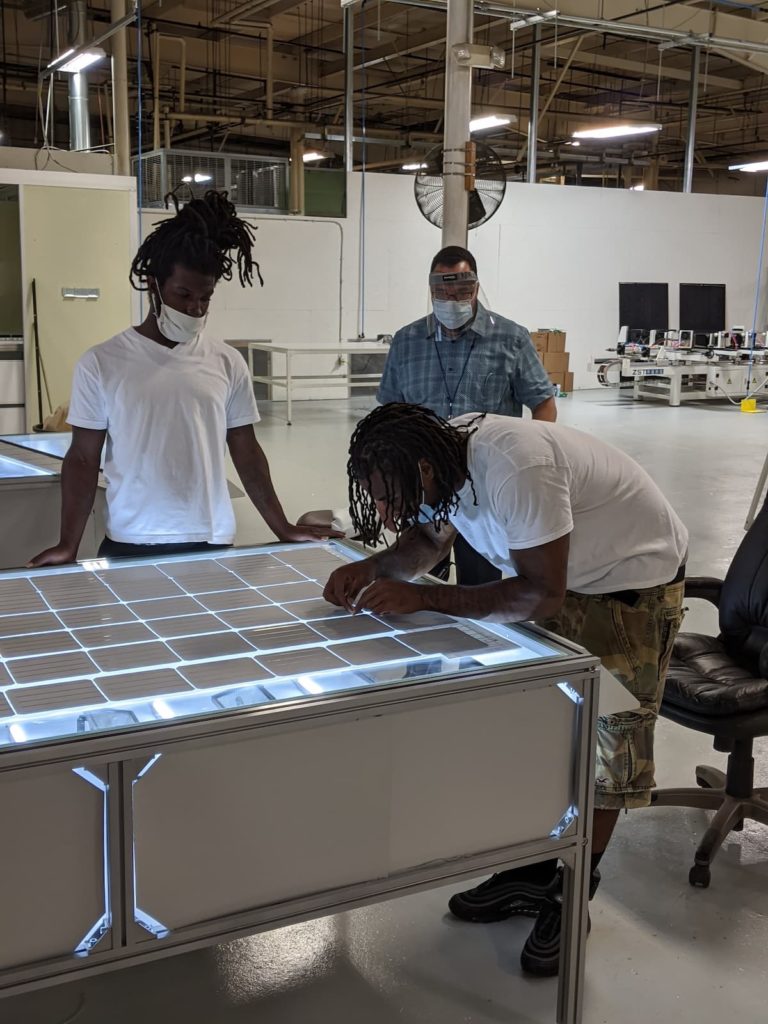Second Chance Employer Profile
Crossroads Solar

Patrick Regan, a former Notre Dame professor of political science and peace studies, and Marty Whalen, a former office technology company executive, met while teaching in the Moreau College Initiative. The program, operated by Notre Dame and Holy Cross College, offers courses at Indiana’s Westville Correctional Facility that can lead to a college degree.
When one of the students mentioned that “Your people won’t hire people like me,” Regan started to figure out how to make that happen. He combined his concern for climate change with his desire to help those who’ve been incarcerated find a job to create Crossroads Solar. He and Whalen discussed the possibility of creating a solar company for a year.
During that time, Regan taught himself how to build a solar panel from scratch in his basement. Then he went to China to look at manufacturing equipment and chose a factory in Wuhan. Regan and Whalen’s connection to Notre Dame helped build the business.
Third-year Notre Dame Law School students negotiated the contracts to buy the equipment. When engineers from Wuhan couldn’t come to set up the equipment, Notre Dame engineer students served as interns who worked with the Chinese engineers over WeChat to get things running.
The company currently has between 10 and 12 employees and operates out of Vested Interest, a small business incubator located in a 100-year-old laundry facility in South Bend, Ind.
Crossroads Solar produces solar panels that it sells to installers and is in the process of expanding its RV solar panel business to help meet the demands of the RV industry, which is heavily concentrated in neighboring Elkhart, Ind.
The company received a grant from the state’s Indiana Career Ready Program to help it train its workers. It’s also working with Notre Dame’s iNDustry Labs to create apprenticeships and ensure its workers will have access to experiential learning, and be able to develop technical skills and gain certifications.
Second chance hiring practices
All employees, with the exception of Regan, are second chance employees. Most employees are found by word of mouth. But the company works with the Indiana Dept. of Corrections, the local HIRE (Hoosier Initiative for Reentry) organization, the local chambers of commerce and the state department of commerce and community affairs to make people aware that it’s hiring formerly incarcerated individuals. It has also reached out to Goodwill and a work release program.
The plant manager is a former student at the Moreau College Initiative that has a degree in engineering from Purdue and a master’s in business administration. He’s the one who recruits, trains and motivates the workforce.
Once hired, Crossroads Solar trains employees on job skills and such life skills as learning how to show up on time, not talking on a cell phone while working and giving a basic day’s effort, according to Whalen. One employee didn’t even realize he had to call in when he was sick, because he had no work history.
One of the biggest challenges in working with this population is to change the workers’ attitudes about criticism. People who’ve been incarcerated seem to have the attitude that any criticism is punitive punishment and not directed toward bettering the person. “When we make corrections, we’re doing it to make sure we end up with a better employee. But a lot of what they had encountered in prison is not corrective behavior at all but petty and punitive. We have to break that mentality,” he says.
